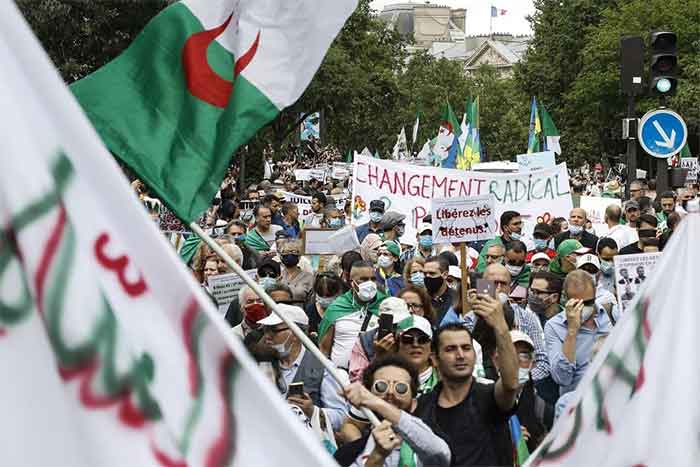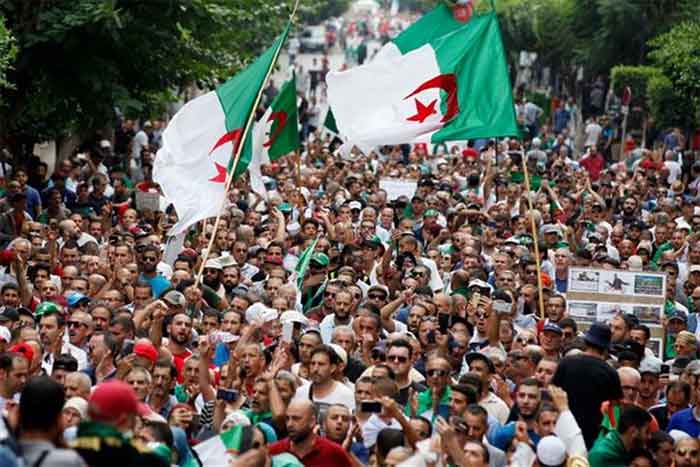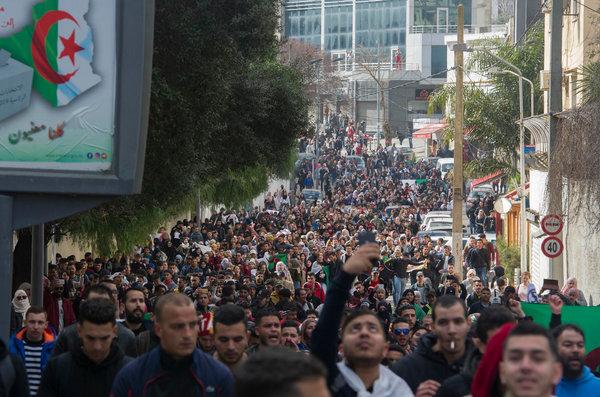
Introduction
In the 1950’s, Algerian freedom fighters rose up against the French occupation, leading the way for other freedom fighters across Africa to gain independence from France, Belgium, Italy, Germany, Dutch, and Great Britain . One after another starting in 1954, countries won their independence against colonial rulers but later fell under the control of their own oppressive regimes. Today Countries across Africa and the Middle East continue to suffer under Dictatorships masked as democracies through the theatrics of elections with predetermined results, supported by the West. Is there an opportunity for change across Africa and the Middle East, again led by Algeria, through a new movement – “Hirak”?
Beginning in February 2019, in a movement known as “Hirak,” millions of Algerians rose up in peaceful demonstrations calling for the removal of an oppressive regime that has held power in the country for 60 years. In response more than 10,000 citizen activists have been detained over the last 3 years, and today nearly 300 remain in custody including journalists, lawyers, professors, and students. Despite this repression of freedom of speech, the movement has not been deterred.
Today the Hirak movement in Algeria is poised to lead the way to freedom and democracy in Africa and the Middle east. To understand this, we must look back at how the 1950’s uprising led to colonial fall across Africa. It was after the Algerians rose for their independence from France in 1954, that France decided to relinquish its colonies in the African and Middle East regions to dedicate its resources to keep Algeria under its rule. Ahlman (2010) suggested that “the armed struggle of the Algerian Revolution (1954–1962) helped transform African perceptions of the political and social processes of decolonization in the late 1950s and early 1960s.” The refusal of the Algerians to all forms of oppression and domination predates the French occupation. El-Naggar (2022) affirmed that “When Algerians mobilize within the Hirak, they draw on a long history of collective protest – whether during the era of the Ottoman Empire, French colonization or the modern-day le pouvoir [the de facto power], people have repeatedly shown that they will act when the social contract is endangered.” Once again, Algeria will be at the forefront of the new generation of worldwide movements for the liberation of oppressed peoples by their own rulers, through creative nonviolent social justice movements.
While people in the region welcome any aspirations for freedom and democracy, as they have shown during the Arab spring uprising, authoritarian ruling regimes continue to oppose citizens’ dreams for positive change. As worthy successors to colonial France, the current regimes apply the same tactics learned from their French masters. Sometimes, they use violence and repression and at other times they use Machiavellian cunning. Shepard (2011) noted that in the 1950s, after failing to satisfy indigenous people demands by using violence, France tried to implement a new policy of discrimination and integration. The intent of this new policy resembles what the Algerian regime now calls the “national reunion”, a new policy aimed to contain peoples’ anger and opposition to their rule. Nevertheless, pretending to unite people after jailing and torturing many of them, imposing fraudulent elections, and naming docile public servants to lead state institutions is nothing else but a chimera.
Algeria today and Hirak genesis
Algerians’ struggle for their independence from the French occupation (1830-1962) has claimed seven years of bloody war and more than a million martyrs. For more than five decades, the curse has haunted Algeria punctuated by popular demonstrations including the dark decade of the civil war of the 1990s. The popular upheaval of February 2019 was, therefore, inevitable and the current regime that has imposed its rule has become a threat to Algeria’s stability and even its existence as a nation. Lebovitch (2022) asserted that, according to U.S. and European policy makers, they see Algeria “as a potential source of tension and conflict,” particularly after 2013, which had seen overt political struggle inside the regime. When the Arab spring started in Tunisia in late 2010, many observers expected that the protests would spread into Algeria. Instead of that, freedom fever has spread south, sweeping away authoritarian leaders in Libya, Egypt, and threatening the Syrian regime. However, the freedom wave came to Algeria almost nine years later. Millions of Algerian people rose up peacefully demonstrating for total regime change.
Hirak is not Arab spring
If we owe Arab spring to the self-immolation of an informal vegetable seller, following his altercation with a Tunisian policewoman, Hirak, nevertheless, is the consequence of a series of previous popular revolts crushed by the Algerian regime. Indeed, Algeria has seen at least seven popular revolts including black Berber spring in 1980, deadly revolt in 1988, which claimed more than 500 deaths in one week, and another Black Berber spring in 2001. Kessar et al (2021) explained that “[o]n the 22 February 2019, Algerians launched one of the most impressive social movements for democracy the world has seen—and one which is largely unreported in the West.” Protests in Algeria are not necessarily about food or socio-economic issues.
On July 5th, Algeria celebrated its 60th Independence Day. The geopolitical situation, including the Russian-Ukraine crisis and the ongoing Hirak, may have obliged the Algerian regime to go for a full grandiose military parade. Associated Press (2022) reported that “[o]pposition figures and pro-democracy activists called the elaborate celebrations an effort to distract attention from Algeria’s economic and political troubles by glorifying the army and called for the release of political prisoners.” Military parade shows how the Algerian regime has not evolved and continues to think and behave as if the world has not changed. Darbouche & Zoubir (2009) asserted that “Algeria’s process of political liberalization in the late 1980s failed to produce genuine transition to democracy. Instead, the country experienced a dreadful decade-long crisis, which besides affecting its societal development, had wider domestic and international repercussions.” Since the beginning, the demonstrators have not ceased to demand the total departure of all the corrupt politicians (yetnahou gaa: they must all leave), in other words, total and radical change of the regime, not regime reform, which has prevailed since the independence of the country in 1962.
Peacefulness to fight tyranny
Peaceful protests, despite brutal and deadly response of security forces including arbitrary arrests, torture, rape, and psychological pressure have proven to be devastating to the regime, but not enough to collapse it. So far, the Algerian regime has been able to get back on its feet. Lee’s (2015) study has shown that “the main factor determining the success or failure of popular revolts is the military’s response — whether the armed forces defect and side with the protesters or suppress the mass demonstrations and uphold authoritarian rule.” Unlike with Sadam, Gaddafi, Assad, Mubarak, the Algerian military regime is not personified. Indeed, it consists of a group of corrupt senior officers who represent different interests and have civilian cronies who represent their interests in the supposedly civilian government. Ghanem (2019) explained that “[d]espite the existence of factions, the[military] institution forged its unity in crisis and remains undivided. The various blocs within the army have the same self-perception: They see themselves as the guardians of the nation, the custodians of Algeria and its people.” The Algerian regime has always, and successfully, managed to keep a semblance of civil government and use it as a buffer to keep popular anger and seduce international partners. No matter their divergence, the various courants within the military institution can manage their differences to maintain status quo and keep doing business as usual.
How history repeats itself in different context and time
The early 1950s witnessed one of the greatest liberation movements in the world. Some historians argued that Algeria had become a centerpiece of the East-West struggle for the post WWII world order. Connelly (2001) affirmed that Algeria could have become a Cold War battleground if China and Soviet Union regulars and volunteers had infiltrated Algeria. At the time, France did everything in its power to keep the Algerian war as an internal affair and chose rather to call it “les événements d’algérie.” (Algeria events) The current regime uses similar arguments. Under the cover of non-interference in internal affairs, the regime tries to counter all attempts of the international community denouncing human rights violations by pretending that there are no prisoners of conscience and Algeria is sovereign. Frontline Defenders (2021) reported that peaceful Hirak activists are intimidated and labeled as criminals and traitors threatening national unity and undermining the morale of the troops.
Hirak may inspire other social justice movements around the world and affect their inter collaboration. It can also generate mistrust, particularly among authoritarian regimes for fear of contagion against their interests. Nevertheless, Western democracies may also be reluctant vis a vis an unknown and seemingly leaderless movement, which can destabilize an established status quo in the region. Saturnino et.al (2018) argued that “the multiple contemporary converging crises have significantly altered the context for and object of political contestations around agrarian, climate, environmental and food justice issues. These shifts affect alliances, collaboration and conflict among and between state and social forces, as well as within and between movements and societies.” Western policy makers’s lack of imagination and courage prevent them from developing sustainable policies that do not jeopardize universal principles. Short term goals including oil supply, intel sharing on international terrorism issues and to a certain extent counteracting Russia-China threat should not justify western flexible human rights policy, while authoritarian regimes consolidate their bases by regrouping around the nascent Russia-China new world order scheme.
People outside Algeria have been asking if Hirak is still alive. Algerian people would say that Hirak is an ideal idea, which will never die. Hirak nevertheless lacked firm international support. This could certainly be explained by the fact that Algerians are very susceptible to the idea of foreign interference and intervention. This should not prevent the international community from showing its unconditional support for any peaceful movement that aspires to democracy and thereby give hope to millions of Algerians who continue to dream of a better future. Cook (2019) suggested that “American policymakers saw the Algerians, [precisely the Algerian regime] as suitable counterterrorism partners, but overall the relationship remained distant. As a result, Washington has little in the way of resources, leverage, and will to influence developments in Algeria. That is probably a good thing, because even the people who know Algeria well do not understand how decisions are made there. These demonstrations are an Algerian story—it is best to keep it that way.” While Cook’s views on staying away from Algerian internal affairs may be understandable, a U.S firm condamnation of the regime’s behavior will boost Algerians’ morale who will, in the last resort, finally snatch their independence; and this is not foreign interference.
Conclusion
All authoritarian regimes rely on the corrupt part of their security apparatus, docile public servicemen, and the economic oligarchies they create to support their financial survival. Since its independence in 1962, Algeria has seen a series of popular revolts, nevertheless limited in time and space, but all brutally crushed by this aging regime. What is unique about Hirak is that it remains spaceless and timeless. For the first time, the popular protests are not limited to the capital city of Algiers or the rebellious region of Kabilya. Fedele (2021) noted that peaceful street protests all over Algeria expressed diversity through visual performance including banners, posters, photos, and artistic shows, which reflected Algeria’s diversity. February 2019 took everybody off guard. Despite the regime’s claims that Algeria is on track, the socio-economic and political situation continues to deteriorate, which is one of the raison d’etre of Hirak is less visible and grandiose as it used to be until COVID-19 broke that momentum. However, Hirak continues but under different forms and it will continue to adapt if the same political ingredients remain in place. Like their ancestors during the Algeria-France war, the contemporary Hirak will pave the way for other movements. The world has changed. Likewise, upheavals have shifted from ideological revolutions to nonviolent social justice movements. The world will be freer and better off with democratic regimes, which will favor peoples’ aspirations for better lives. Some people may argue that U.S. flexible short sighted foreign policy in the region may achieve immediate goals. Nevertheless, a democratic and stable Algeria will contribute to a sustainable peace and prosperity in the regions of Mediterranean Basin, North Africa, and Sahel
Bio: Hamid Lellou is the CEO of RI-SE (Reaching Independence through Social Engagement), and conflict resolution analyst. He has more than 30 years of experience in the Middle East and Africa affairs. His extensive experience, working in both the informal and formal business markets in Africa, supervising international nonprofit programs, managing refugee camp operations, and interacting with numerous foreign government officials has afforded him the opportunity to develop in-depth knowledge and an inter-disciplined perspective of the regions.
Sources
Ahlman, J. S. (2010). The Algerian Question in Nkrumah’s Ghana, 1958–1960: Debating “Violence” and “Nonviolence” in African Decolonization. Africa Today, 57(2), 66–84. https://doi.org/10.2979/africatoday.57.2.66
Connelly, M. (2001). Rethinking THE Cold War and Decolonization: The Grand Strategy O The Algerian War for Independence. International Journal of Middle East Studies, 33(2), 221-245. doi:10.1017/S0020743801002033
Cook, S., A. (2019). Don’t Get Your Hopes Up About Algeria. Council on Foreign Relations. Middle East Program. https://www.cfr.org/article/dont-get-your-hopes-about-algeria
Darbouche, H., & Zoubir, Y. H. (2009). The Algerian crisis in European and US foreign policies: a hindsight analysis. The Journal of North African Studies, 14(1), 33-55.
El-Naggar, L. (2022). Algeria’s Hirak Movement: A Second National Liberation? The Swedish Institute of International Affairs. https://www.ui.se/globalassets/ui.se-eng/publications/ui-publications/2022/ui-paper-no.-1-2022.pdf
Fedele, V. (2021). The Hirak. The Visual Performance of Diversity in Algerian Protests. Partecipazione e conflitto, 14(2), 681-701.
Frontline Defenders (2021). Harassment of Algerian human rights defenders must end. https://www.frontlinedefenders.org/en/statement-report/harassment-algerian-human-rights-defenders-must-end
Ghanem, D. (2019). How Algeria’s Military Rules the Country. Carnegie Middle East Center: Aug 08-2015. How Algeria’s Military Rules the Country – Carnegie Middle East Center – Carnegie Endowment for International Peace (carnegie-mec.org)
Kessar et al. (2021). The Representation of the Algerian Hirak Protest Movement in the International Media: France 24 and Al-Jazeera. Cogent Social Sciences (2021), 7: 1930646 https://doi.org/10.1080/23311886.2021.1930646
Lebovich, A (2022). A New European Agenda for North Africa. Algeria: The stirrings of change? European Council on Foreign Relations. https://www.jstor.org/stable/pdf/resrep21607.8.pdf
Lee, T (2015). Defect or defend: Military responses to popular protests in authoritarian Asia. John Hopkins University Press, 2015, Pp. 252. Notes, Bibliography, Index. doi:10.1017/S0022463417000339
Saturnino M. Borras Jr., Tsegaye Moreda, Alberto Alonso-Fradejas & Zoe W. Brent (2018) Converging social justice issues and movements: implications for political actions and research, Third World Quarterly, 39:7, 1227-1246, DOI: 10.1080/01436597.2018.1491301
Shepard, T. (2011). Algeria, France, Mexico, UNESCO: A transnational history of anti-racism and decolonization, 1932–1962. Journal of Global History, 6(2), 273-297. doi:10.1017/S174002281100026X













































